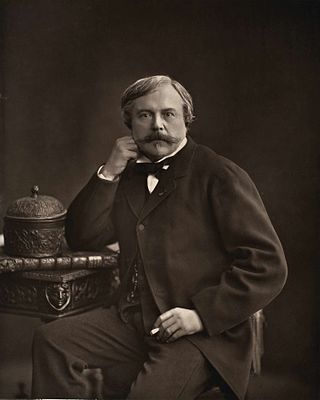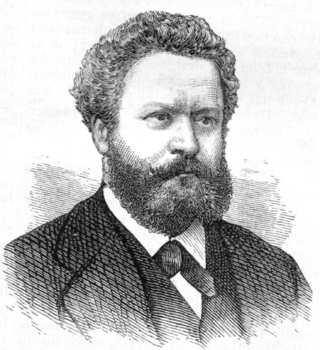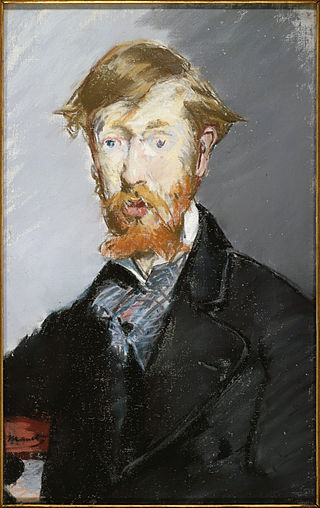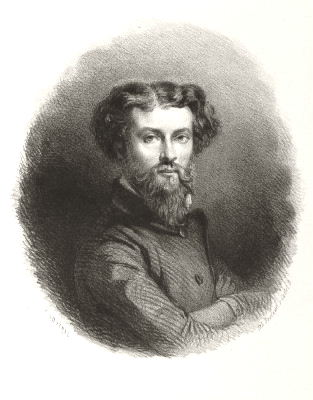Le Voltaire was a French daily newspaper first published on 5 July 1878. It ceased publication in the 1930s. [1]
Nicknamed Le Figaro républicain, the paper was created in order to support Gambetta, the leader of the Republican Union, the party of moderate radicals.
Its founding editor was Aurélien Scholl. The first issue announced that it was "daily, political, republican, satirical". The paper's name represented anticlericalism and it announced that "We know the potential dangers of the cowl-wearers." An editorial in the first issue said: [1]
We want to disperse, once and for all, in this free and enlightened world of our republic, the last fatalities and the last remains of ignorance, which is the nemesis of the spirit, and of hatred, which is the enemy of the heart.
Writers who contributed to the paper included Émile Zola, the Goncourt brothers, Guillaume Livet, [2] and Paul Alexis. The paper also published longer works in serial form, including those of Zola and George Moore (A Mummer's Wife as La Femme du cabotin, July–October 1886). [3]
A guide to Parisian newspaper published in 1882 described several of its writers as "some of the first journalists in France", one "brilliant" and another "teeming with imagination". It included Le Voltaire under the heading "Republican newspapers" and noted that it had published a long series of articles in favor of legalizing divorce. [4]

Dada or Dadaism was an art movement of the European avant-garde in the early 20th century, with early centres in Zürich, Switzerland, at the Cabaret Voltaire. New York Dada began c. 1915, and after 1920 Dada flourished in Paris. Dadaist activities lasted until the mid 1920s.

Henri René Albert Guy de Maupassant was a 19th-century French author, remembered as a master of the short story form, as well as a representative of the Naturalist school, who depicted human lives, destinies and social forces in disillusioned and often pessimistic terms.

Émile Édouard Charles Antoine Zola was a French novelist, journalist, playwright, the best-known practitioner of the literary school of naturalism, and an important contributor to the development of theatrical naturalism. He was a major figure in the political liberalization of France and in the exoneration of the falsely accused and convicted army officer Alfred Dreyfus, which is encapsulated in his renowned newspaper opinion headlined J'Accuse…! Zola was nominated for the first and second Nobel Prize in Literature in 1901 and 1902.

Edmond Louis Antoine Huot de Goncourt was a French writer, literary critic, art critic, book publisher and the founder of the Académie Goncourt.

Hippolyte Adolphe Taine was a French historian, critic and philosopher. He was the chief theoretical influence on French naturalism, a major proponent of sociological positivism and one of the first practitioners of historicist criticism. Literary historicism as a critical movement has been said to originate with him. Taine is also remembered for his attempts to provide a scientific account of literature.

Edmond François Valentin About was a French novelist, publicist and journalist.
This article contains information about the literary events and publications of 1893.
This article contains information about the literary events and publications of 1876.

George Augustus Moore was an Irish novelist, short-story writer, poet, art critic, memoirist and dramatist. Moore came from a Roman Catholic landed family who lived at Moore Hall in Carra, County Mayo. He originally wanted to be a painter, and studied art in Paris during the 1870s. There, he befriended many of the leading French artists and writers of the day.
This article contains information about the literary events and publications of 1733.

Nana is a novel by the French naturalist author Émile Zola. Completed in 1880, Nana is the ninth installment in the 20-volume Les Rougon-Macquart series.

The National Front for an Independent France, better known simply as National Front was a World War II French Resistance movement created to unite all of the Resistance Organizations together to fight the Nazi occupation forces and Vichy France under Marshall Pétain.

Claude Cahun was a French surrealist photographer, sculptor, and writer.

Lucas Malet was the pseudonym of Mary St Leger Kingsley, a Victorian novelist. Of her novels, The Wages of Sin (1891) and The History of Sir Richard Calmady (1901) were especially popular. Malet scholar Talia Schaffer notes that she was "widely regarded as one of the premier writers of fiction in the English-speaking world" at the height of her career, but her reputation declined by the end of her life and today she is rarely read or studied. At the height of her popularity she was "compared favorably to Thomas Hardy, and Henry James, with sales rivaling Rudyard Kipling." Malet's fin de siecle novels offer "detailed, sensitive investigations of the psychology of masochism, perverse desires, unconventional gender roles, and the body."
20th-century French literature is literature written in French from 1900 to 1999. For literature made after 1999, see the article Contemporary French literature. Many of the developments in French literature in this period parallel changes in the visual arts. For more on this, see French art of the 20th century.
Nationality words link to articles with information on the nation's poetry or literature.

L'Assiette au Beurre was an illustrated French weekly satirical magazine with anarchist political leanings that was chiefly produced between 1901 and 1912. It was revived as a monthly for a time and ceased production in 1936.
For centuries Paris has been the home and frequently the subject matter of the most important novelists, poets, and playwrights in French literature, including Moliere, Voltaire, Balzac, Victor Hugo and Zola and Proust. Paris also was home to major expatriate writers from around the world, including Henry James, Ivan Turgenev, Oscar Wilde, Ernest Hemingway, James Joyce, Leopold Senghor, James Baldwin, Richard Wright, Milan Kundera and Henry Miller. Few of the writers of Paris were actually born in Paris; they were attracted to the city first because of its university, then because it was the center of the French publishing industry, home of the major French newspapers and journals, of its important literary salons, and the company of the other writers, poets, and artists.

Louis Énault was a French journalist, novelist and translator. He sometimes used the pseudonym Louis de Vernon.
Eugene Davis was an Irish writer, journalist, poet and nationalist, who wrote Souvenir of Irish footprints over Europe.